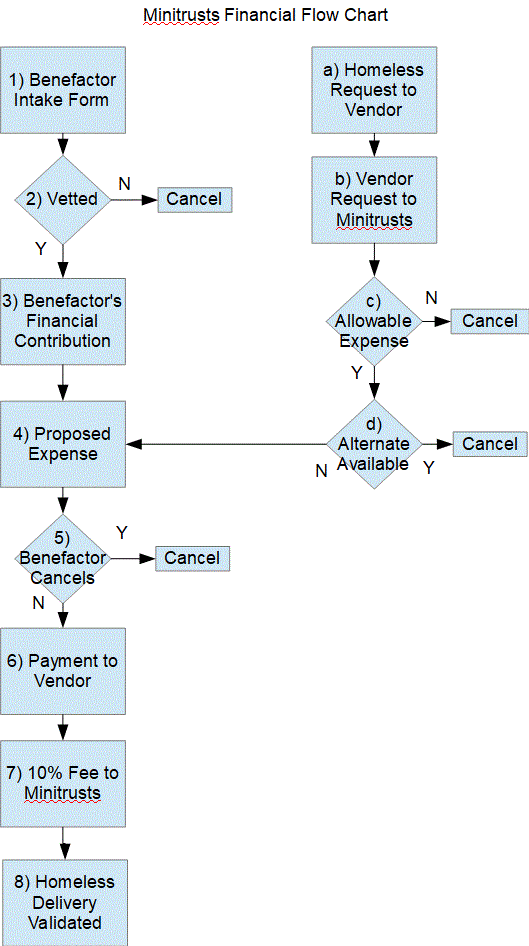
Whether you are a beneficiary like a homeless or elderly person, or someone interested in helping one (the benefactor), the process begins with a free online application on our Contact-Us Page.
After our review, a homeless person’s application can be posted (with your permission) to our gallery where any visitor can click the “Help Me” button to become a benefactor. Our Minitrust activity begins once your benefactor arrives.
1) Benefactor Intake Form
A benefactor’s application begins by asking for your particulars, which we consider confidential. We ask about the homeless person you wish to help. We will need just enough information to be able to unmistakably identify that person to make sure that our payments from your account benefit only that person. We can point you at services to track down a homeless relative or friend if you’ve lost touch.
The application form includes the categories of expenses that you wish to allow from your account, for example:
- Child care
- Court ordered payments (Many benefactors choose not to allow court ordered payments.)
- Food
- Clothing
- Counseling
- Housing
- Medical care
- Work-related tools or resources, including for self-employment
- Documentation support such as obtaining a driver’s license, birth certificate, Social Security card, etc.
- Credit repair services
- Treatment (substance abuse, anger management, basic financial management, etc.)
3) Benefactor’s Financial Contribution
Per the flowchart at right, the benefactor puts an initial deposit into their account to be used for the allowed expenses. This is all reflected in a confidential online account statement to which the benefactor gets a username and password. You can change the allowable expense categories any time, or even to close the account with a refund of all unspent funds.
We then provide the homeless person with a card as in the example below for John Smith:
"The Minitrust Project of the nonprofit Second Chance Net Inc holds an account with funds available to pay certain expenses of the bearer, John Smith. If you and the bearer have identified products or services that would benefit the bearer, you are encouraged to go to www.minitrusts.com/contact.html to contact us and request payment. After we verify you and the bearer, we will make the payment directly to you, assuming an allowable expense."
Note that a key aspect of a Minitrust is that payment is made directly to the product or service provider so that the homeless person has no opportunity to divert or loose the funds nor to have them extorted.

b) Vendor Request to Minitrusts
When we get a payment request, we first verify that the beneficiary (homeless person) doesn’t have an alternate source of funds such as a government assistance program designed to pay the expense, often unknown to the beneficiary. Our Minitrust Coordinators are well versed in the social programs applicable to the homeless, ex-felons, and the elderly -- and how to guide them to make proper use of such assistance programs.
c) Allowable Expense
Once we have verified that we have an allowable expense to pay to the intended vendor on behalf of the correct beneficiary that is not covered by alternate sources, we enter a line item in the benefactor’s account. This automatically generates an email notice to the benefactor with a 24-hour right to cancel the payment.

4) Proposed Expense
Not having received such a cancellation, we make the payment and charge a fee equal to 10% of the payment. This is our only fee to operate the Minitrust Program. There are no hidden charges, tax withholding, surcharges, or any other fees.
8) Homeless Delivery Validated
Within a few days, we do our best to verify that the product or service has been provided to the beneficiary (homeless person).
As the balance approaches zero or when we are unable to pay an allowable expense, we notify the benefactor to make an additional donation into their account if they feel like it.
A beneficiary may have more than one benefactor, each with their own account.
The account will indicate whether the beneficiary is to be notified of the benefactor’s name when payments are made.
The account will have a notes section where we can put a few words about the publicly available health and status of the beneficiary as we learn it, with a cc to the benefactor.
Q&A
Common Concerns and Clarifications
